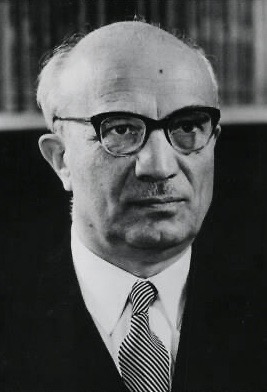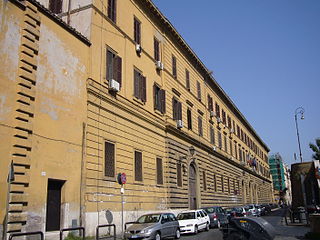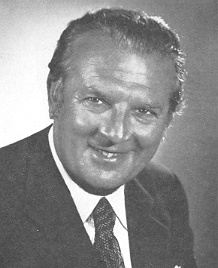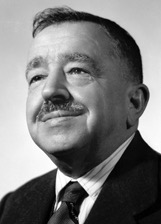
Giuseppe Santoro (born 1930) is an Italian former diplomat who was also active in politics as a supporter of the Socialists. He was head of Italy's mission to Cuba and was drawn into corruption investigations in the 1990s.

Giuseppe Santoro (born 1930) is an Italian former diplomat who was also active in politics as a supporter of the Socialists. He was head of Italy's mission to Cuba and was drawn into corruption investigations in the 1990s.
Giuseppe Santoro was born in Ceglie Messapica, Apulia, in 1930, His father, Mario Santoro, was a lawyer whose family had come originally from Naples but had moved to Rome during the second half of the 19th century. His grandfather and great-grandfather had been high-ranking officers in the Italian army. His mother's family was from the region of Apulia, where they were lawyers and also olive oil producers, and hence Santoro's birth there. His son is artist Mario Santoro - Woith
Santoro attended school and university in Rome and gained his degree in law at the Sapienza University of Rome, receiving the highest distinction.[ citation needed ]
Santoro started in the diplomatic service in 1958, and served in the Italian Government until 1997. At the Italian Foreign Ministry he was Mission Head in Cuba,[ citation needed ] headed the cooperation for development section from 1990 to 1991, [1] and later served as director for third-world aid. [2] [3] He was eventually appointed Ambassador to the U.N. Food and Agriculture Organization. [1] Shortly thereafter, on 25 March 1993, he was arrested on charges of complicity in bribery and abuse of office, as part of a wider corruption inquiry. [1] [2] [3]
Santoro held the office of International Cooperation Institute of the Italian Socialist Party. He was one of the main supporters of the President of the Socialist Party, Riccardo Lombardi. He was a member of the Central Committee of the Socialist Party from 1975 until its dissolution during the nineties.
Santoro was appointed as representative of the Foreign Affairs Minister at the University for Foreigners Perugia. During these years he organized a study program for the Masters in International Politics for foreign students. These students come from different countries, such as the Mediterranean area and Afghanistan. He also taught International Politics on the faculty of International Communications and International Relations.

Giuseppe Mazzini was an Italian politician, journalist, and activist for the unification of Italy (Risorgimento) and spearhead of the Italian revolutionary movement. His efforts helped bring about the independent and unified Italy in place of the several separate states, many dominated by foreign powers, that existed until the 19th century. An Italian nationalist in the historical radical tradition and a proponent of a republicanism of social-democratic inspiration, Mazzini helped define the modern European movement for popular democracy in a republican state.

Christian Democracy was a Christian democratic political party in Italy. The DC was founded on 15 December 1943 in the Italian Social Republic as the nominal successor of the Italian People's Party, which had the same symbol, a crusader shield. As a Catholic-inspired, centrist, catch-all party comprising both centre-right and centre-left political factions, the DC played a dominant role in the politics of Italy for fifty years, and had been part of the government from soon after its inception until its final demise on 16 January 1994 amid the Tangentopoli scandals. Christian Democrats led the Italian government continuously from 1946 until 1981. The party was nicknamed the "White Whale" due to its huge organisation and official colour. During its time in government, the Italian Communist Party was the largest opposition party.

Benedetto "Bettino" Craxi was an Italian politician and statesman, leader of the Italian Socialist Party (PSI) from 1976 to 1993, and the 45th prime minister of Italy from 1983 to 1987. He was the first PSI member to become prime minister and the second from a socialist party to hold the office. He led the third-longest government in the Italian Republic and he is considered one of the most powerful and prominent politicians of the First Italian Republic.

Forza Italia was a centre-right liberal-conservative political party in Italy, with Christian democratic, liberal, social democratic and populist tendencies. It was founded by Silvio Berlusconi, who served as Prime Minister of Italy four times.

Amintore Fanfani was an Italian politician and statesman, who served as 32nd prime minister of Italy for five separate terms. He was one of the best-known Italian politicians after the Second World War and a historical figure of the left-wing faction of Christian Democracy. He is also considered one of the founders of the modern Italian centre-left.

Ilir Rexhep Meta is an Albanian politician who served as President of Albania from 2017 to 2022.

The Italian Socialist Party was a social democratic and democratic socialist political party in Italy, whose history stretched for longer than a century, making it one of the longest-living parties of the country. Founded in Genoa in 1892, the PSI was from the beginning a big tent of Italy's political left and socialism, ranging from the revolutionary socialism of Andrea Costa to the Marxist-inspired reformist socialism of Filippo Turati and the anarchism of Anna Kuliscioff. Under Turati's leadership, the party was a frequent ally of the Italian Republican Party and the Italian Radical Party at the parliamentary level, while lately entering in dialogue with the remnants of the Historical Left and the Liberal Union during Giovanni Giolitti's governments to ensure representation for the labour movement and the working class. In the 1900s and 1910s, the PSI achieved significant electoral success, becoming Italy's first party in 1919 and during the country's Biennio Rosso in 1921, when it was victim of violent paramilitary activities from the far right, and was not able to move the country in the revolutionary direction it wanted.

Giovanni Gronchi, was an Italian politician from Christian Democracy who served as President of Italy from 1955 to 1962 and was marked by a controversial and failed attempt to bring about an "opening to the left" in Italian politics. He was reputed the real holder of the executive power in Italy from 1955 to 1962, behind the various Prime Ministers of this time.

Pietro Sandro Nenni was an Italian socialist politician and statesman, the national secretary of the Italian Socialist Party (PSI) and senator for life since 1970. He was a recipient of the Lenin Peace Prize in 1951. He was one of the founders of the Italian Republic and a central figure of the Italian political left from the 1920s to the 1960s.

The People's Revolutionary Government (PRG) was proclaimed on 13 March 1979 after the Marxist–Leninist New Jewel Movement overthrew the government of Grenada in a revolution, making Grenada the only socialist state within the Commonwealth. In Grenada, the revolution is referred to as the March 13th Revolution of 1979 or simply as “The Revolution”. The government suspended the constitution and ruled by decree until a factional conflict broke out, culminating in an invasion by the United States on 25 October 1983.
Avanti! is an Italian daily newspaper, born as the official voice of the Italian Socialist Party, published since 25 December 1896. It took its name from its German counterpart Vorwärts, the party-newspaper of the Social Democratic Party of Germany.

Giuseppe Di Vittorio, also known as Mario Nicoletti, was an Italian trade union leader and communist politician. He was one of the most influential trade union leaders of the labour movement after World War I.

The Italian Democratic Socialist Party, also known as Italian Social Democratic Party, was a social-democratic political party in Italy. The longest serving partner in government for Christian Democracy, the PSDI was an important force in Italian politics, before the 1990s decline in votes and members. The party's founder and longstanding leader was Giuseppe Saragat, who served as President of the Italian Republic from 1964 to 1971. Compared to the like-minded Italian Socialist Party, it was more centrist, at least until Bettino Craxi's leadership, infact, it identified with the centre-left.

The Years of Lead were a period of political violence and social upheaval in Italy that lasted from the late 1960s until the late 1980s, marked by a wave of both far-left and far-right incidents of political terrorism and violent clashes.
In 1991, the Socialist Party of Albania, with specific social democratic ideology took control of the country through democratic elections. One year later the Democratic Party of Albania won the new elections. After 1990, Albania has been seeking a closer relationship with the West. What followed were deliberate programs of economic and democratic reform, but the implementation of capitalism led to the proliferation of pyramid schemes. Chaos in late 1996 to early 1997, as a result of the collapse of these pyramid schemes, alarmed the world and prompted the influx of international peacekeeping forces. In 1995, Albania was accepted into the Council of Europe and requested membership in NATO and is a potential candidate country for accession to the European Union. The workforce of Albania has continued to emigrate to Western countries, especially Greece and Italy.
Giuseppe Giulietti was an Italian sailor who became a leading trade union activist. He was one of the few figures ostensibly on the left wing of Italian politics to publicly support Benito Mussolini, declaring for the fascist leader in 1922.

Regina Coeli is the best known prison in the city of Rome. It was formerly a Catholic convent and became a prison in 1881.

Mario Zagari was an Italian socialist politician, who served in the Italian Parliament and in the European Parliament as well as in the Italian governments in various capacities.

Giuseppe Romita was an Italian socialist politician. He served several times as a cabinet minister and member of the Italian Parliament.
Leone Cattani was an Italian lawyer, politician and anti-Fascist activist.